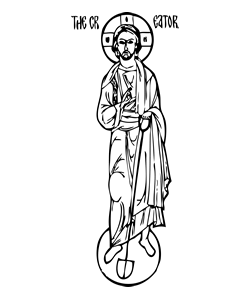|
|||
|---|---|---|---|
| This weekly bulletin insert complements the curriculum published by the Department of Christian Education of the Orthodox Church in America. This and many other Christian Education resources are available at http://dce.oca.org. | |||

In Colossians 1:18-29 Saint Paul is speaking to Christians in the city of Colossae in Asia Minor, who are tempted to seek hidden, exclusive knowledge that others don't have. At the time when this letter was written, false teachers were busily preaching and teaching in places where Paul had preached and taught the truth. Many of these false teachers were Gnostics, who advocated and encouraged others to adhere to ideas that were far from the teaching of the apostles. First, the Gnostics claimed that Jesus Christ was only one of several "savior angels" and that He was not superior to the angels. Christians believe that He is above every created being, including angels, and that He is the only Savior. Christ is, with His Father and the Holy Spirit, the Creator of all things. This is why Paul writes (v.16) about Jesus Christ that "by Him all things were created that are in heaven and on earth, visible and invisible, whether thrones or dominions or principalities or powers." Another idea promoted by the Gnostics was that matter is evil, so evil that they said the world was created not by God but by the devil, because God would never have anything to do with mere matter. For Gnostics the only significant thing in human life was the spirit, not the body. To counter this Paul emphasizes "the body of His flesh" as the means by which He, Jesus Christ, can "present you holy and blameless and irreproachable before Him." Paul in fact makes a point of talking about his own body and about the Church as Christ's body. He writes, "Now I rejoice in my sufferings for your sake, and in my flesh I complete what is lacking in Christ's afflictions for the sake of His body, that is, the church..." One of the most basic teachings of Gnosticism was that the only way to become a spiritual human being—the most desirable possible human achievement--was to gain secret knowledge not accessible to every person, but only certain ones. This idea was very threatening to the Church because the Gnostics looked down on Christianity as a primitive faith and prized secret rituals over the sacraments of the Christian Church. Opposing this idea, Paul writes that he became a minister "according to the divine office which was given to me for you, to make the word of God fully known, they mystery hidden for ages and generations but now made manifest to His saints." In other words, God sent Paul as a divinely-appointed minister to His people so that Paul could reveal to them the "knowledge of God's mystery, of Christ, in whom are hidden all the treasures of wisdom and knowledge" (2: 2-3). Christians have no reason to seek hidden, exclusive knowledge. The great mysteries are all in God and Jesus Christ, the creators of all things, and our loving God and His Son reveal them to us. |
|||
